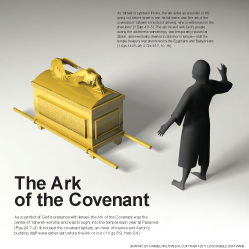3:1–17 Chapters 3–4 describes Israel’s entrance into the promised land. The description emphasizes the solemn observance and commemoration of the event and draws parallels to the momentous passage through the Red Sea (Exod 14; Josh 3). |
3:1 Acacia Grove See note on 2:1.
3:3 the ark of the covenant of In Joshua, the ark is the visible token of Yahweh’s presence among the Israelites in their quest to take the promised land. See Exod 25:10 and note.
is the visible token of Yahweh’s presence among the Israelites in their quest to take the promised land. See Exod 25:10 and note.
Levitical priests The book of Numbers assigns the task of carrying the ark to the Kohathites, who were Levites but not priests (see Num 4:15). This occasion may have been deemed so solemn that priests were charged with the duty normally assigned to non-priestly Levites.
but not priests (see Num 4:15). This occasion may have been deemed so solemn that priests were charged with the duty normally assigned to non-priestly Levites.
 Functions of Priests Table
Functions of Priests Table
3:4 two thousand cubits in measurement Approximately 1,000 yards; see note on Exod 25:10.
Do not come near it This enabled the Israelites to see the ark from a distance since they needed to follow it.
3:6 Take up the ark of the covenant The Israelites carried the ark on poles; they had been commanded earlier not to touch it (see Exod 25:12–13; 37:3–5; Num 4:4–15).
3:7 I will begin Creates anticipation; something unusual is about to happen.
exalting you God exalts Joshua to make it clear to Israel that He is with him.
I will be with you See Josh 1:5.
3:8 you will stand still in the Jordan God commands the priests to enter the Jordan and simply stand there, heightening the anticipation of the camp. See v. 13 and note.
3:10 the living God The phrase used here occurs only three other times in the ot (Pss 42:2; 84:2; Hos 1:10) and speaks to the direct presence of an active God.
Canaanites from before you, and the Hittites, Hivites, the Perizzites, the Girgashites, the Amorites, and the Jebusites The list of nations echoes the list God gave to the patriarchs, confirming that He is acting to fulfill the ancient promises (see Gen 15:19–21; Exod 3:8, 17; 23:23; 33:2; 34:11; Deut 7:1; 20:17).
3:11 The ark of the covenant of See Exod 25:10 and note; Josh 3:3.
the Lord of all the earth Yahweh is not merely the God of Israel but also ultimately sovereign over the entire earth (see Deut 32:8–9; compare Deut 2:9, 19; 26:19).
3:13 they will stand still in one heap When the priests step into the water, the river will stop flowing. The description of the water heaping up parallels the description of events at the Red Sea (see Exod 14:21–22; compare Psa 78:13).
3:15 the days of harvest At harvest time, the river would be in its annual flood stage. Based on modern analogy, it was probably roughly 100 feet wide and 5–10 feet deep. See note on Josh 3:16.
3:16 Adam Located in the Jordan Valley. The wording suggests that the waters of the Jordan were stopped up at this location, not that it was the place where the priests entered the Jordan.
the sea of the Arabah This body of water is known as the Salt Sea and as the Dead Sea.

|
About Faithlife Study BibleFaithlife Study Bible (FSB) is your guide to the ancient world of the Old and New Testaments, with study notes and articles that draw from a wide range of academic research. FSB helps you learn how to think about interpretation methods and issues so that you can gain a deeper understanding of the text. |
| Copyright |
Copyright 2012 Logos Bible Software. |
| Support Info | fsb |
 Loading…
Loading…



